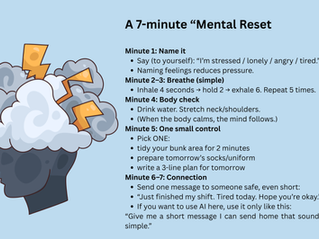How does stress impact our eating behaviors?
- IMEQ CENTER

- Oct 21, 2021
- 3 min read
Updated: Sep 12, 2023
It’s time to consider how stress can play a role in our eatings habits. We live in an era where our work takes up most of our day. For many people work is one of the leading causes of stress. Whether that is the nature of the job, the working conditions or the work environment, it is a fact that we can easily find ourselves feeling overwhelmed. Of course, being overly stressed for a long period of time will eventually start to affect us. Our body will begin to show signs that we are taking on more than we can handle. In many cases, stress will be reflected on our eatings behaviors.
We asked an expert for her advice on the topic. Eva Zikou, Nutritionist and Dietician, helped us better understand how stress impacts our eating behaviors and what we can do to change that. She says, “a large percentage of people will change their eatings habits when undergoing a lot of stress for a long period of time. This change may include a 70% raise in the daily calorie intake of a person.” This can of course impact the person and his/her health but it is not the only way stress may affect us. Zikou continues, “Regardless of the calorie intake, studies show that the food choices also change. When stressed, people prefer options high in fats or sugar. What we call comfort food.”
But how does science tie into this? When a person suffers from chronic stress, there is a rise in his/hers cortisol levels. This hormone may suppress the immune system, it may increase blood pressure and glucose levels in the body, while also decreasing libido and cause acne among other effects. “This is why it is vital to manage work-related stress”, Zikou says. “Let’s not forget that when feeling happy and stress-free, it is not only great for our health but also for our performance at work. Therefore, we have to break the bad cycle; and we can do that by consuming the right foods!” By following a well-balanced, healthy diet, we can help release the “happy” hormones, which are serotonin and dopamine.
Serotonin can be found in foods such as: nuts, fatty fish, avocado, sesame seeds, seafood, leafy greens, oats, dark chocolate, and tea.
Dopamine can be found in foods such as: eggs, matured cheese, yogurt, spinach, and red wine.
At IMEQ Center, we care about promoting mental health wellness and awareness at sea and of course, we understand that it is not always possible to have access to certain foods. We asked Zikou, which foods are an absolute must and can be easily accessible while at sea. She says “The happy hormones can also be found in whole-wheat bread, cereal bars with dark chocolate, unsalted nuts and canned fish.”
Of course, we all have our specific needs and restrictions and we can find more foods that will help us in maintaining a healthy body and a healthy mind. “Our diet can enhance the presence of "good" hormones in our body, while providing us with good nutrition. The foods we identified have the common denominator of the Mediterranean diet. An important point is not to omit the rule of 5 meals per day, in order to supply our body at intervals with the nutrients they need. And of course, let’s not forget or underestimate the effect of the adequate consumption of water, which keeps the body hydrated!”
Now that we have a better understanding of which foods we should include in our diet when feeling stressed, let’s put it all together in sample meal plans:
Day 1
Breakfast: Oatmeal with skim milk, blueberries and mixed unsalted nuts
Lunch: Turkey-and-avocado lettuce wrap
Snack: An orange and pistachios
Dinner: Salmon with broccoli and brown rice
Dessert: A glass of warm milk with cinnamon
Day 2
Breakfast: Plain yogurt with cherries and unsalted almonds
Lunch: Chicken and veggie wrap
Snack: Guacamole with multigrain tortilla chips
Dinner: Chicken and veggie stir-fry over brown rice
Dessert: One square of dark chocolate
Day 3
Breakfast: 2 eggs and a slice of whole-grain toast
Lunch: A salad topped with chicken and avocado
Snack: Carrot sticks and hummus
Dinner: Grilled salmon with asparagus with brown rice
Dessert: A cup of decaf tea
Eva Zikou
Phd(c), MSc, Nutritionist-Dietician
Contact: 6942572912 & 2108940470
Email: zikoudiatrofi@gmail.com
Instagram: https://www.instagram.com/eva.zikou





































































































Comments